| Front cover | Back cover | Buy the CD |
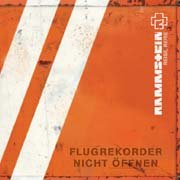 |
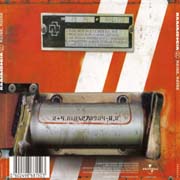 |
Reise, Reise (German for “Arise, Arise” or “Journey, journey”) is the German NDH-metal band Rammstein’s fourth album. It was released on 27 September 2004 in Germany and followed shortly by its release in the rest of Europe. It was released in North America on 16 November 2004. It was in the Top 10 in several European charts and a #1 hit in Germany, Austria, Switzerland, Iceland, Finland, Estonia and Mexico. The album ranked at #67 for Top 100 Albums of 2004 by Rate Your Music.
As used in Reise, Reise aufstehen! Kommt hoch nach alter Seemannsart, the album name is an old sailor’s expression to waken other sailors, hence the translation of the title would be “Arise, Arise”, as seen in the song of the same name. Given Rammstein’s propensity to use puns, a double meaning could well be intended, in which case the title would also translate to “Journey, journey”.
Tracklist
- 1. Rammstein – Reise, Reise (4:11) lyric | tabulature
- 2. Rammstein – Mein Teil (4:21) lyric | tabulature | single
- 3. Rammstein – Dalai Lama (5:38) lyric | tabulature
- 4. Rammstein – Keine Lust (3:42) lyric | tabulature | single
- 5. Rammstein – Los (4:25) lyric | tabulature
- 6. Rammstein – Amerika (3:42) lyric | tabulature | single
- 7. Rammstein – Moskau (4:16) lyric | tabulature
- 8. Rammstein – Morgenstern (4:00) lyric | tabulature
- 9. Rammstein – Stein um Stein (3:56) lyric | tabulature
- 10. Rammstein – Ohne Dich (4:32) lyric | tabulature | single
- 11. Rammstein – Amour (4:50) lyric | tabulature
Additional info
Released: September 27, 2004
Recorded: 2003-2004 in El Cortijo Studios, Málaga, Spain
Genre: Tanz-Metall
Length: 47:40
Label: Motor, Republic Records
Producer(s): Jacob Hellner with Rammstein
Song Information
1. Reise, Reise (Arise, Arise or Journey, journey)
Reise, Reise is about mutiny on a ship, and the opening song of the 2004/05 Ahoi! Tour.
2. Mein Teil (My part)
Mein Teil was inspired by the 2001 Armin Meiwes cannibalism case. The lyric was written after one of the band members brought a newspaper with the story to a rehearsal. “Mein Teil” attracted controversy in Germany, with the media dubbing it the “Kannibalensong”, and this helped to boost it to second place in the German music charts after its release in early August 2004. The song has also been remixed by Arthur Baker and Pet Shop Boys (these versions are included on the CD single).
In live performance, Till Lindemann appears dressed as a blood-stained chef holding a microphone with a large butcher’s knife attached to the end. He pulls out a giant cooking pot with a portable keyboard attached to one side. Keyboardist Christian “Flake” Lorenz appears in the pot, with metal cylinders attached to his arms and legs, and plays the keyboard during the song. After the second chorus, Till takes a flamethrower and roasts the bottom of the pot, “cooking” Flake. Flake escapes from the pot and starts running around the stage with flames erupting from his arms and legs, while chased by a knife-wielding Till.
The video shows Till eating and copulating with an angel; Flake performing ballet; Richard wrestling his twin, Oliver writhing on the floor; the whole band fighting in a mudpit; and five of the band members crawling out of a Berlin U-Bahn (subway) station while held on leashes carried by Christoph Schneider dressed as a woman. This content led to its airing on TV being restricted to after 11pm.
3. Dalai Lama
Dalai Lama is an adaptation of “Der Erlkönig”, a poem written by Johann Wolfgang von Goethe (1749-1832) in 1782 and subsequently set to music by many composers, including Franz Schubert (1797-1828) in 1815. The band apparently considered calling the song “Erlkönig” in homage to Goethe’s poem. “Flugangst” (“fear of flying”, literally “flight fright”) was also considered as a name before Rammstein settled on “Dalai Lama” in reference to the current Dalai Lama’s well-publicised dislike of air travel. Other than this somewhat oblique reference, the song does not have anything to do with Tibetan Buddhism or the Dalai Lama.
The song replaces Goethe’s travelling man and child on horseback with a man and child on an aircraft, and the Erlkönig himself with the “king of all the winds”. As in the poem, the travellers are menaced by a mysterious spirit which “invites” the child to join him (though only the child can hear the spirit’s invitation). Rammstein’s version differs markedly from Goethe’s original in describing the fate of the child. In the poem, the child cries out that the Erlkönig is abducting it. The alarmed father rides for help, holding the child in his arms, only to find that his son is dead; Rammstein replaces this with a typically morbid twist: after running into a storm sent by the “king of all the winds” which threatens all the passengers, the terrified father suffocates the child by holding him too tightly and the child’s soul joins its “brothers” in the winds.
4. Keine Lust (No desire or Don’t feel like it)
“Keine Lust”, also released as a single, digipack and two-track, describes the band’s disaffection with fame and money. The video, filmed in January 2005 and released a month later, portrays an aged, fat future version of the band, playing a reunion. Flake appears in a motorized wheelchair. At the end of the video, the rest of the band abandons Flake, after he arrives late. The video was nominated for the MTV European Music Awards in November 2005.
On the video “The Making of Keine Lust”, guitarist Richard Z. Kruspe discusses the meaning of the song and video:
“You know, after all of these years we’re full-up! Fame, success, money. We don’t want to do anything anymore! Nothing! That’s the idea in the song. We’ve returned to the starting point again. We just want to make music again. We don’t want all the circus that goes with it anymore. So, we meet up again, one more time, for one more performance – just to make music together. The fact that we are fat is just symbolic for excess. It’s really just about returning to the beginning.”
5. Los ([Let’s] go or -less)
Los features acoustic guitars, a bluesy electric guitar solo, and a harmonica. The rather curious lyrics may describe the experience of Rammstein as a musical group, and contain some interesting plays on words, such as “…sie sind gott…LOS!” (“they are god…less.”)
6. Amerika (America)
“Amerika” was the second single released from Reise, Reise. It deals with the worldwide dominance of the culture of the United States. It is sung largely in German with a chorus partly in English: We’re all living in Amerika, Amerika ist wunderbar, We’re all living in Amerika, Amerika. It has received mixed reviews: some perceive it as anti-American, others as being opposed to globalization. The band views it as a satirical commentary on Cocacolonization.
The video shows the band in Apollo-era space suits on the Moon with shots of other cultures acting like Americans. The end of the video shows that the band have actually been in a fake Moon set in a studio, complete with film crew, a reference to the Apollo moon landing hoax accusations. Till Lindemann, Rammstein’s lead singer, wears a space suit with the name “Armstrong” on it – a reference to Neil Armstrong, the first man on the Moon.
During live performances of this song, Flake is often seen riding around on a Segway HT; confetti cannons, with red, white and blue confetti in them, are also used. This parodies the ticker-tape parade. During a concert in Gothenburg, Sweden on July 30, 2005, Till Lindemann suffered a knee injury when Flake accidentally ran into him with the Segway. This caused concerts scheduled in Asia and Latin America to be canceled.
7. Moskau (Moscow)
Rumored to have originally been intended as a duet with Yulia Volkova of Russian pop duo t.A.T.u., it instead features the vocals of Viktoria Fersh, whose voice bears a strong resemblance to Volkova’s. The song refers to the Russian capital of Moscow and features two perspectives on the city: its beauty and culture, and the undercurrents of corruption and prostitution.
8. Morgenstern (Morning-star)
A girl who is so ugly that she hides from the daylight so as not to scare it away. At night she pleads with the morning star to make her beautiful.
9. Stein um Stein (Stone by stone)
A slow monologue about someone building a little house to entomb his victim alive – a possible interpretation of Edgar Allan Poe’s The Cask of Amontillado. The riff during the chorus resembles the riff after the second chorus in Rosenrot; it was originally going to be the first single from Reise, Reise but was dropped in favour of “Mein Teil”)
A similar theme is to be found in Romanian mythology. In the folk poem Monastirea ArgeÅŸului (“The Monastery on the ArgeÅŸ River”), Mesterul Manole has to wall his wife, in order to finish the monastery he is building[1].
Another interpretation is that the song refers to the Berlin Wall and the former East German government; until the end of 1989, East Germans were not readily allowed into the capitalist West.
An interesting pun exists in the lyrics during the final verse of the song. Till sings, “Wenn ich sie in dein Leibholz ramm-…Stein um Stein…” The literal translation is, “When I ram them into your body-wood…Stone by stone…” However, because of German grammar and conjugation rules, the verb “ramm,” meaning “to ram” must be placed at the end of the sentence. Thus, this creates “ramm-…Stein,” wordplay alluding to the name of the band.
10. Ohne dich (Without you)
“Ohne dich” was released as the third single from the album on 22 November 2004 in Germany, Switzerland and Austria. Other countries’ releases followed. It follows a slow, even romantic balladic style. The central motif is Without you, I cannot be, without you…, With you, I am also alone, without you…
The single includes as its 6th track the so-called beta version of what should have been part of Mutter. “Ohne dich” was planned for Mutter, but then dismissed.
The video was filmed in the Kaun Valley and on the Pitz Valley glacier in Tyrol, Austria. It shows the band members climbing and hiking.
11. Amour (French for Love)
The song talks about love and the pain that goes with it. The song compares love to a wild animal that looks forward to catch and keep people with its long teeth and arms. It also talks about the subtle nature of love (lässt sich fallen weich wie schnee- it falls like soft snow) but also how it often ends ( am ende tut es weh- at the ends it hurts).
Trivia
U.S. edition
On this release, the easter egg fragment is placed at the beginning of “Reise, Reise” in normal playback.
The 2005 pressing does not contain the easter egg, but the original 2004 pressing does.
Japanese edition
In May 2005 Rammstein released a special Japanese version of Reise, Reise. It has two bonus tracks, a bonus DVD and different cover art which was later used as the Rosenrot cover art, slightly altered.
The first 38 seconds (the introduction in the American version and “easter egg” in the European version) of the title track were removed for the Japanese Edition in deference to the Japan Airlines Flight 123 disaster.
Album art
The case cover shows a damaged airplane flight data recorder depicted on the front and back covers. Its caption (“Flugrekorder//nicht öffnen”) means “Flight recorder//do not open”. The inner part of the Digipak edition case shows a picture of the six members in suits wielding suitcases and weapons leaving from a crashed airplane.
The CD itself has a silver matte/reflective relief surface which depicts a radar. All versions include a booklet with the lyrics.
The cover art is an allusion to the song Dalai Lama, which deals with an airplane accident. It is also suggestive of the overarching ‘travelling’ theme of the album.
The airplane accident on which the album is based occurred on the 12 August 1985, nearly 20 years earlier. A Boeing 747, Japan Airlines Flight 123 took off from Haneda airport, Tokyo, and about 30 minutes later, crashed into the side of a mountain. 520 out of the 524 passengers and crew died, and it is still the worst single aircraft disaster in history.
The song “Reise, Reise” itself contains a recording of the last 40 seconds of the flight, however, on some pressings, you have to rewind it before the 0:00 mark to hear it.
Singles
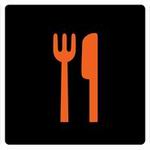
Mein Teil (2004)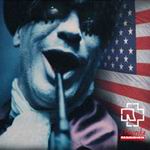
Amerika (2004)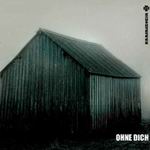
Ohne Dich (2004)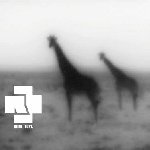
Keine Lust (2005)
Copyright Information:
Music & lyrics by Rammstein: Christoph Schneider, Christian Lorenz, Till Lindemann, Paul Landers, Richard Z. Kruspe, Oliver Riedel
Produced by Jacob Hellner with Rammstein
Recorded at El Cortijo studio, Malaga, Spain.
Drums recorded at studios 301, Stockholm, Sweden.
Engineered by Ulf Kruckenberg.
Logic & protools programming by Florian Ammon.
Mixed by Stefan Glaumann at Toytown studio Stockholm, Sweden.
Mastered by Howie Weinberg at Masterdisk corporation, New York, USA
All songs published by BMG Music publishing (local companies).
All rights for the world by Musik-dition Discoton GmbH / BMG Germany (GEMA). All rights for the US O/B/O Musik-Edition Discoton admin. by BMG songs, inc. (ASCAP)
Management: Emanuel Fialik & Pilgrim management GmbH
Add. choir arrangements “AMerika”, “Morgenstern”, “Mein Teil” by Sven Helbig, Performed by “Dresdner Kammerchor”, conducted by Andreas Pabst
Add. choir on “Amerika” by “Kinderchoir Canzonetta”
Add. vocal appearance on “Moskau” by Victoria Fersh
Add. string arrangements “Reise, Reise” by Sven Helbg, “Ohne dich” by Olsen Involtini, “Stein um Stein” by Sven Helbig & Olsen Involtini
Orchestra parts played by deutsches filmorchester Babelsberg, conduted by Wolf Kerschek, coordination by Nucleus, Jens Kuphal
Oboe on “Ohen dich” by Bärbel Bühler, Accordion on “Reise, Reise”, “Moskau” by Mickael Kaden, Mandolins on “Ohne dich” by “Köpenicker Zupforchester”
Orchestra & choir session recorded at Scoringstage@Saal, Berlin, engineered by Michael Schubert, assisted by Holger Swhark, protools operatr Jonas Zadow
Photography by Olaf Heine, A. Bruner, U. Kühn
Concept & Sleeve design by Plantage* & Alex Brunner
Retrieved from en.wikipedia.org/wiki/Reise Reise Read the copyright at the bottom.









